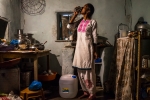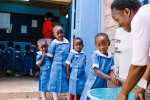Project Safewater: Honduras
Producing Clean Water and Cultural Change
In providing sustainable access to drinking water in Colon, Honduras, Pentair created a radical shift in the understanding of the value of clean, safe water, and a process that could be replicated elsewhere.
Only 30 to 50 percent of water projects in developing countries function over the long term. Appropriate technology has to be paired with capacity building and education and awareness.
Today, each one of the approximately 300,000 residents in the Colón region of Honduras has access to clean, safe and affordable drinking water. But getting there wasn’t easy. In working with people who have free access to water sources, providing access to clean water isn’t enough. It would take not only the water treatment system, but also a significant shift in awareness of safe water and hygiene practices to maintain it.
A Widespread Issue
Prior to Pentair's involvement in 2007, Colón was an example of a community facing safe water access problems plaguing many developing countries. The district’s residents got their drinking water from nearby sources with high counts of coliform bacteria, indicative of fecal contamination. Such contamination can lead to severe illness in the form of diarrhea, fever and extreme dehydration, and even death. But for the people of a poor region, free water was the only option.
The Integrated Solution
For years, various aid organizations have attempted to tackle safe water problems. Despite advances in technology and billions of dollars expended, it is estimated that only 30 to 50 percent of water projects are functioning at any given time. As a leader in water technology, Pentair wanted to understand the root causes of this failure rate, and test ways to improve on it.
Pentair questioned why communities that had been provided water treatment systems would go back to getting their water from contaminated sources. Taking a step back to explore the bigger picture unearthed a massive insight: The obstacles to safe water were as much about habits and education as they were about technology. Solving these challenges, then, required an integrated approach – one that paired safe water with sanitation services as well as hygiene education.



